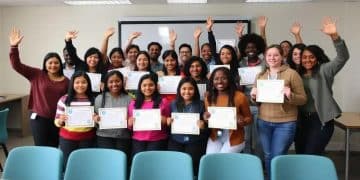Career readiness programs – emerging trend to watch

Career readiness programs are essential for equipping individuals with the skills, knowledge, and experience necessary to succeed in the workforce, adapting to trends like technology use, soft skills emphasis, and personal branding.
Career readiness programs are becoming essential in today’s job market, helping individuals prepare for the demands of various careers. Have you thought about how these programs could enhance your skills and boost your employability?
The importance of career readiness programs
Career readiness programs play a crucial role in preparing individuals for success in the workforce. These programs offer training and resources that help participants develop essential skills needed for various careers.
Why Are They Important?
With the constantly changing job market, it is important to be equipped with the right tools. Career readiness programs help bridge the gap between education and employment. They enable individuals to understand industry expectations and gain practical experience.
Key Benefits of Career Readiness Programs
- Enhance employability by building relevant skills
- Provide networking opportunities with professionals
- Offer insights into current job trends
- Increase confidence in job search processes
Furthermore, these programs often feature real-world scenarios and hands-on learning, allowing participants to apply what they learn in a practical setting. Engaging in activities such as internships, workshops, and mentorship can significantly boost one’s readiness. Successful completion of a career readiness program demonstrates a commitment to personal growth and professional development.
Ultimately, participating in a career readiness program can set individuals apart from other job seekers. With the right preparation and training, the pathway to a fulfilling career becomes clearer. Investing time in these programs is not just beneficial; it is essential for navigating the complexities of the modern job landscape.
Key components of successful readiness initiatives

Successful readiness initiatives have several key components that enhance their effectiveness. These elements are vital for ensuring that participants get the most out of their experience. Implementing these components can significantly improve the outcomes of career readiness programs.
Comprehensive Skill Development
One primary component is comprehensive skill development. Programs must address both hard and soft skills. Hard skills include technical abilities related to specific jobs, while soft skills encompass communication, teamwork, and problem-solving. A well-rounded skill set makes participants more attractive to employers.
Hands-On Learning Opportunities
Another important aspect is providing hands-on learning opportunities. Real-world experiences through internships, job shadowing, and project-based learning allow participants to apply their skills in actual work settings. This practical exposure not only builds confidence but also enhances understanding.
- Internship programs that connect learners with local businesses
- Workshops focusing on resume writing and interview techniques
- Mentorship from industry professionals to guide participants
Moreover, networking plays a crucial role in readiness initiatives. Providing participants the chance to meet with industry professionals can open doors. Strong networking skills allow them to build relationships that may lead to job opportunities.
Accessibility is equally important. Successful programs make an effort to reach a diverse audience. Ensuring that initiatives are available to people from different backgrounds can lead to a more inclusive workforce, benefiting everyone.
Ultimately, when career readiness programs incorporate these key components, they better prepare participants for the challenges of the job market. Investing in such comprehensive strategies will pay off in creating a workforce that is ready and able to meet employer needs.
How to choose the right program for you
Choosing the right career readiness program is essential for reaching your goals. This process can be daunting, but understanding the key factors helps simplify your decision. With the right program, you can gain valuable skills and insights that lead to greater job success.
Assess Your Career Goals
First, it’s crucial to assess your career goals. What industries interest you? What skills do you need to succeed? By clearly defining your objectives, you can narrow down programs that align with your aspirations.
Research Available Programs
Next, research the available programs. Look for options that provide comprehensive training and real-world experience. Make sure to check reviews, program outcomes, and the reputation of the providers. Some programs may focus on technical skills while others might emphasize soft skills, so choose according to your needs.
- Look for programs with strong industry connections
- Check if they offer internships or hands-on training
- Evaluate the support services available for students
In addition to reviewing program details, consider the time investment required. Some programs might demand more hours than you can commit. Balance your available time with the expected outcomes of the program.
Another important factor is cost. Look for programs that offer financial aid or payment plans if affordability is a concern. This will make your choice easier and more practical.
Lastly, talk to alumni or current participants. Learning from their experiences can provide you with unique insights into the program. They can also share how the program has impacted their careers, adding to your understanding.
Future trends in career readiness

Understanding future trends in career readiness is vital for staying competitive in the job market. As technology evolves, so do the needs for skills and competencies. Recognizing these trends allows individuals to prepare better for their future careers.
Technology Integration
One significant trend is the integration of technology in career readiness programs. Virtual reality and online simulations are becoming more common. These tools provide hands-on learning experiences without the need for a physical workplace. With technology, participants can practice skills in a controlled environment, enhancing their confidence before entering the job market.
Focus on Soft Skills
Another emerging trend is the increasing focus on soft skills. Employers are looking for candidates who not only have technical abilities but also possess strong communication, teamwork, and problem-solving skills. Programs are adapting by including training that emphasizes these essential capabilities.
- Team-building exercises for better collaboration
- Workshops on effective communication techniques
- Training sessions focused on critical thinking
Additionally, there is a growing need for personal branding. As competition increases, individuals must learn how to market themselves effectively. This includes optimizing resumes, utilizing LinkedIn, and practicing interview skills. Programs that teach these elements are becoming more valuable.
Moreover, remote work trends have also influenced career readiness. Programs are shifting to prepare individuals for virtual job environments. This includes training on managing remote teams, understanding virtual communication tools, and adapting to different workplace cultures.
Lastly, continuous learning is becoming a significant focus. As industries change rapidly, the opportunity for lifelong learning can benefit careers. Emphasizing a growth mindset and providing resources for ongoing education will equip individuals to adapt to the evolving job landscape.
FAQ – Frequently Asked Questions about Career Readiness Programs
What are career readiness programs?
Career readiness programs are designed to equip individuals with the skills, experience, and knowledge needed for the workforce.
How can technology improve career readiness programs?
Technology enhances these programs by providing virtual training, simulations, and online resources that make learning more accessible and engaging.
Why are soft skills important in career readiness?
Soft skills, such as communication and teamwork, are critical for success in the workplace and are highly sought after by employers.
How do I choose the right career readiness program?
Identify your career goals, research options, assess the program’s reputation, and consider factors like cost and flexibility.





